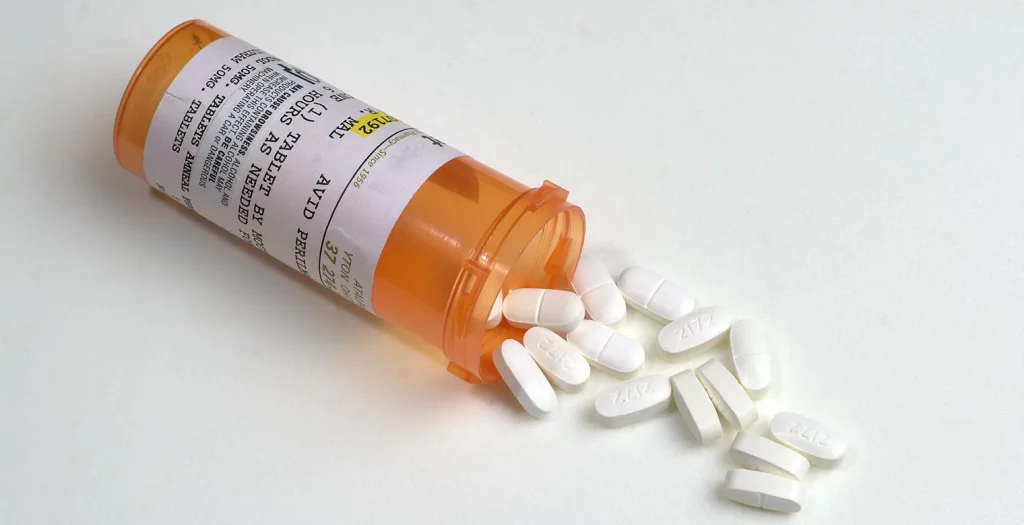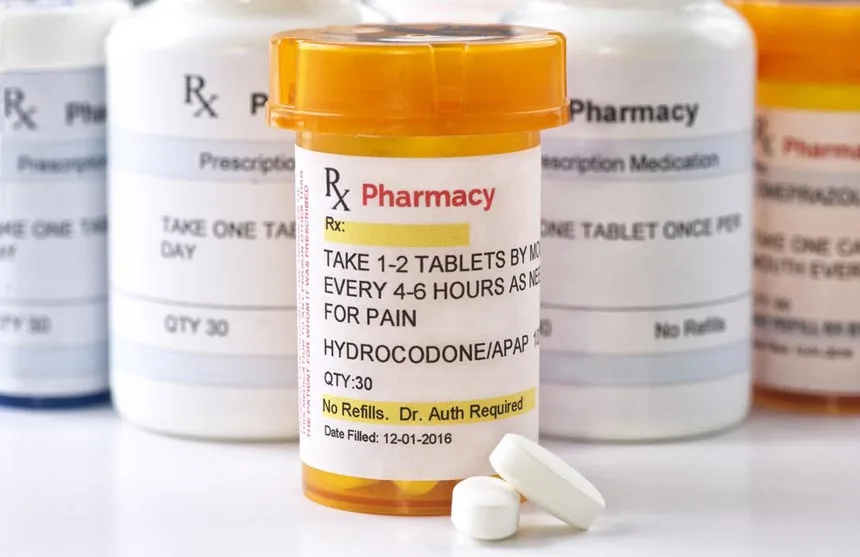What is Hydrocodone?
Table of Contents
- What is Hydrocodone?
- What Makes Hydrocodone Addictive?
- Who is at Risk of Drug Abuse?
- Recognizing the Signs of Substance Abuse
- The Side Effects of Hydrocodone
- Hydrocodone Withdrawal Symptoms
- Hydrocodone Addiction Treatment Methods
- Hydrocodone Addiction Rehab Programs
- Why Choose Professional Hydrocodone Addiction Treatment
- Finding Hydrocodone Addiction Treatment and Rehab Programs Today
- Medically Reviewed By
Hydrocodone is a powerful opioid drug that is often prescribed for treating moderate to severe pain. However, like many prescription pain medications that fall into the opioid class, this drug is also highly addictive and can result in the need for an effective hydrocodone addiction rehab.
Unfortunately, prescription drug addiction has become an increasingly prevalent issue within the United States, with opioid overdose deaths rising higher than ever in recent years. As more and more people are becoming dependent on and addicted to their prescription pain relievers, hydrocodone rehab treatment options have become more accessible across the nation.
What Makes Hydrocodone Addictive?
Like other prescription opioids, Hydrocodone affects the body by binding to opioid receptors in the brain. Once this has occurred, the drug begins blocking pain signals from traveling throughout the body, helping to relieve pain.
However, while this can be great for treating chronic pain, this interaction is also what often encourages people to abuse Hydrocodone, such as taking it without a prescription, or using it past their prescribed timeframe, as they believe this will prolong or enhance its effects.
Unfortunately, many people will not realize they have formed a dependence on this drug until they experience withdrawal symptoms when attempting to reduce or stop their Hydrocodone use.
Who is at Risk of Drug Abuse?
Anyone is capable of developing habits of drug abuse, regardless of their personal background or environment. However, there are several factors that may increase an individual’s risk of developing a substance addiction, including:
- Having personal or family history of addiction.
- Having an unstable or negative work, home, and/or school environment.
- Having negative social influences or relationships.
Amongst these risk factors, one of the most significant influencers in a person’s risk of substance abuse is the existence of any underlying mental illnesses, especially those that have gone undiagnosed or untreated.
Understanding the Relationship Between Substance Abuse and Mental Health
According to the Substance Abuse and Mental Health Services Administration (SAMSHA), it is quite common for individuals to abuse drugs and alcohol as a means of self-medicating their mental health conditions.
While this may provide relief from their painful thoughts and feelings, this relief will only be temporary and will end up making these conditions worsen over time. This substance abuse may actually also cause these individuals to develop additional mental health disorders, as well.
Recognizing the Signs of Substance Abuse
For many people struggling with Hydrocodone addiction, whether to the common M365 pill or some other form of the drug, accepting that they have lost control of their drug use can be difficult. However, this is an absolutely necessary first step in being able to overcome their addiction.
As with any other form of opioid addiction, there are several signs that may indicate that you or a loved one is struggling with Hydrocodone abuse, such as:
- Continuing to use Hydrocodone, even if this is causing problems at work, home, or school.
- Repeatedly failing to reduce or stop substance use by oneself.
- Experiencing intense drug cravings when not using Hydrocodone.
- Developing a Hydrocodone tolerance is characterized by having to use it in higher amounts or more frequently to achieve the desired effect.
- Continuing to use Hydrocodone despite this causing or worsening an underlying health condition or mental illness.
- Experiencing withdrawal symptoms when reducing or stopping Hydrocodone use.
The Side Effects of Hydrocodone
Abusing Hydrocodone or other opioids can result in several harmful effects, some of which can be fatal if not properly addressed. Some of the more immediate effects of Hydrocodone abuse include:
- Pinpoint or dilated pupils
- Shallow or slow breathing
- Seizure
- Respiratory failure
- Loss of consciousness
Over time, significant harm to the individual’s organs may occur from prolonged Hydrocodone abuse, including extensive liver damage and even possible failure – this, which, may not be reversible.
Hydrocodone Overdose Symptoms
If someone takes too much Hydrocodone or is using Hydrocodone combined with other drugs, this will significantly increase an individual’s risk of overdose. Knowing how to recognize the signs of opioid overdose can be life-saving. These may include:
- Blue-tinted fingernails and lips
- Slowed, labored, or completely stopped breathing
- Cold, clammy skin
- Seizure
Hydrocodone Withdrawal Symptoms
For those attempting to overcome a Hydrocodone addiction, it is never advised to quit using this substance all at once, or “cold turkey.” This is because the body has become dependent on this substance, meaning removing it from one’s system can cause various adverse side effects.
These are known as withdrawal symptoms, which can be extremely uncomfortable and, in extreme cases, life-threatening. The Hydrocodone withdrawal period typically lasts between five to seven days, with symptoms peaking by around day three of this process.
Some of the various side effects that may develop during withdrawal may include:
- Excessive shivering and sweating
- Diarrhea and constipation
- Insomnia
- Chills
- Fever
- Excessive yawning
- Stomach crampings
- Nausea and vomiting
- Body aches and pain
- Severe anxiety and depression
- Irregular or rapid heart rate
- Mood swings
- Drug cravings
- Runny nose
During the initial rehabilitation phase, a medical detox program can help manage these withdrawal symptoms until the abused Hydrocodone has been completely removed from their system.
Hydrocodone Addiction Treatment Methods
There are many substance abuse treatment options available for those struggling with prescription opioid abuse, including Hydrocodone addiction. While this treatment process can vary based on each individual’s personal care needs, this will generally include:
- Medical Detox
- Inpatient Treatment
- Outpatient Treatment
If you are not sure which recovery services will best fit your personal care needs, speaking with your healthcare provider or an addiction specialist, such as a Find Addiction Rehabs representative, can help you narrow down your treatment options.
Medical Detox
A medically-supervised detox process is usually the first step in a person’s treatment for Hydrocodone addiction. These programs can help manage and even prevent many Hydrocodone withdrawal symptoms.
Many people believe that the best way to get over opioid addiction is to go through withdrawal cold turkey. This is untrue because not only is it unsafe, it can be needlessly traumatic and painful.
Addiction is not logical; therefore, the idea of going through a painful withdrawal to deter the use of hydrocodone in the future is not effective. What is more helpful is safe, managed withdrawal followed by rehab.
During this process, individuals will receive constant support and supervision from licensed medical professionals, helping to ensure that their recovery process is as safe and structured as possible.
Usually, two types of treatments are used in hydrocodone detoxification: medications and behavioral therapies. Medications are used to treat withdrawal symptoms, stabilize the patient, and in some cases, treat comorbid mental disorders.
Behavioral therapies are used to treat mental disorders and the psychological effects of withdrawal as well as to help the patient prepare for rehab. Receiving treatment at a detox recovery center may also include nutritional counseling to help individuals better establish healthier habits.
Those who seek out a detox recovery center must remember that this is only the first part of overcoming their Hydrocodone addiction, and that rehabilitation should follow this program. After all, detox treats dependence, not addiction.
Medication-Assisted Treatment
This may include medication-assisted treatment, as addiction medicine can further reduce withdrawal effects and drug cravings. This will not allow individuals to more effectively recover from their substance use disorder, but will significantly decrease their risk of relapse, as well.
Medications like clonidine, methadone, or buprenorphine might be used to minimize withdrawal symptoms and make the patient more comfortable during withdrawal.
Behavioral Therapies
Behavioral therapies teach coping skills and ways to avoid the triggers, cravings, and stresses that could lead to relapse when recovering from an opioid use disorder. These may include services such as:
- Cognitive-behavioral therapy
- Dialectical behavioral therapy
- Individual therapy
- Family therapy
- Group therapy
Various rehab centers may offer holistic therapies and addiction treatment services that provide a whole-body treatment experience for their clients and better support relapse prevention, offering another extensive layer of recovery support. These may include:
- Adventure therapy
- Animal-assisted therapy
- Stress management
- Social skills
- Yoga
Hydrocodone Addiction Rehab Programs
Hydrocodone rehabilitation comes in many forms, and the treatment itself should be catered to the individual patient. Since there are so many types of rehab, it is best to consider treatment plans which will work for your recovery and to seek out the program most resembling your top choice.
Rehab centers offer different addiction treatment options from inpatient treatment centers to outpatient centers and partial hospital programs to intensive outpatient programs. Some are more intensive than others and offer more supervision, managed care, and security.
Those who are afraid they will return to using hydrocodone when not supervised may want to choose a 24-hour rehabs program like an inpatient or residential center. Every patient is different, however. You may feel perfectly safe seeking outpatient care and asking your loved ones to watch over you in the evenings.
Of course, not every treatment center will offer every one of these programs, and there are many types of facilities available for hydrocodone-addicted individuals. Whatever you need in terms of recovery help, it is important to seek it out, so you can smoothly transition from a life of drug abuse to a happier, safer existence, free from hydrocodone and its serious consequences.
Inpatient Addiction Treatment
Inpatient Hydrocodone addiction treatment offers a highly structured and supportive recovery environment. This may include residential treatment options, which foster a less clinical and more home-like recovery environment.
These treatment centers help to eliminate external temptations and triggers while providing constant access to recovery tools and resources. It is for these reasons that inpatient care is usually recommended for those with more severe addictions.
Outpatient Addiction Treatment
An outpatient recovery center can provide a more flexible and affordable treatment approach than seeking treatment through more intensive levels of care. These programs allow individuals to continue living at home throughout the duration of their treatment process.
This will most likely include participating in sober support groups, which can help keep recovering individuals dedicated to their goal of overcoming their addiction and maintaining abstinence.
This gives these individuals the opportunity to continue tending to their external responsibilities and lives, such as work, home, school, or other obligations, while still receiving the recovery support they need.
Why Choose Professional Hydrocodone Addiction Treatment
Hydrocodone addiction is a serious issue. According to the Drug Enforcement Administration, it has been the second most frequently encountered prescription opioid in drug evidence at all levels (local, state, and federal) in the United States since 2009.
There are various reasons why someone should seek out professional treatment when trying to break free of their addiction to this prescription drug. This is because it is highly difficult to break free of a hydrocodone addiction by oneself, especially as this drug is so widely abused.
Many people who try to quit on their own have trouble simply because the drug is so easy to get. This can quickly lead to relapse, which can be very dangerous with a drug like Hydrocodone.
There are other dangerous side effects associated with trying to recover from hydrocodone without professional help. Detox without medical monitoring can be life-threatening, and it is also the most likely time for a person to experience a deadly overdose.
You could be risking your own life if you try to recover from opioid addiction without professional care. Rather than focusing on fear, however, consider the relative ease with which you can put your drug abuse behind you if you choose professional treatment.
It is best to give yourself the right tools with which to recover from Hydrocodone addiction, and you can receive these through hydrocodone rehab. After all, addiction is a disease and a medical issue, and you will require the proper treatment to be able to overcome it safely.
Finding Hydrocodone Addiction Treatment and Rehab Programs Today
If you or someone you know needs help with substance abuse, Find Addiction Rehabs is here to help. Our hotline is available 7 days a week 24 hours a day. Call now and we will match you with a treatment provider and rehab programs that are dedicated to serving all your care needs.
Our sole purpose is to provide effective, long-term care for those recovering from drug abuse and addiction, so don’t hesitate and call us now so that we can help you get started on your recovery journey and achieve long-term sobriety!
Rachael Goldstein has been a freelance writer for more than 10 years, having written for Find Addiction Rehabs for the past two years. She specializes in writing about the law, mental health, psychology, and addiction. She is the owner and author of the website www.addicted-to-sobriety.com. Rachael is also a licensed attorney in the state of Pennsylvania.





